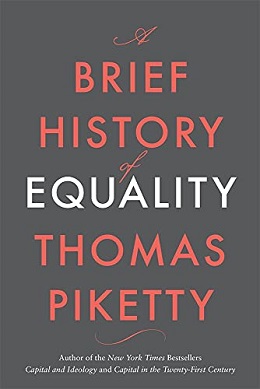Top Qs
Timeline
Chat
Perspective
A Brief History of Equality
2022 book by economist Thomas Piketty From Wikipedia, the free encyclopedia
Remove ads
A Brief History of Equality is a non-fiction book by the French economist Thomas Piketty translated by Steven Rendall from the original 2021 Une brève histoire de l'égalité,[1] about wealth redistribution,[2] in which Piketty describes why he is optimistic about the future.[3]
Remove ads
Overview
In this 288-page book targeting an audience of citizens, not economists, Piketty summarizes his two previous books, his 2014 696-page Capital in the Twenty-First Century[4] and his 2019 1150-page book Capital and Ideology.[5][6] In Capital, Piketty said that a possible remedy for inequality lay in a "global tax on wealth".[7] In A Brief History, he developed the concept of a progressive increase in the tax on the wealthy.[6]
Remove ads
Reviews
Summarize
Perspective
In her Financial Times' review, economist Diane Coyle said that in A Brief History, Piketty advocates for politico-economic change to reduce inequalities but does not describe practical solutions for achieving that goal.[8]
The Literary Review described the book as "an activist's history"—a manifesto as well as an overview of the past.[9]
In his review in The Wall Street Journal, Tunku Varadarajan, a fellow of the American Enterprise Institute (AEI), said that he doubts that—without capitalism—the erosion of inequality and developments in economics and technology that Piketty described could have happened.[10]
While Piketty did not make predictions about the future, his work—which also includes his previous publications such as Capital in the Twenty-First Century—is "partly responsible" for the move away from the "hypercapitalism" of the twenty-first century, according to Columbia Journalism School's Nicholas Lemann in his review for The New York Times.[11]
Piketty condensed twenty years of his research into 300 pages with the goal of making it more accessible to a wider readership than Capital in the Twenty-First Century, according to Antoine Reverchon in his Le Monde book review. Reverchon said that Piketty's effort was worthwhile at a time when the left is mindlessly attempting to bring too many issues together under the same umbrella—"environmentalism, reformism, feminism, post-colonialism, anti-capitalism". Piketty calls for the state to increase access to quality health care, education, employment through the progressive implementation of taxation on the most wealthy. He also called for a "decommodification" of certain sectors that have become privatized including education, health, transport and energy. Piketty recognizes the real and historic fears of Soviet socialism and central planning—his socialism is participatory.[6]
Remove ads
References
Wikiwand - on
Seamless Wikipedia browsing. On steroids.
Remove ads

